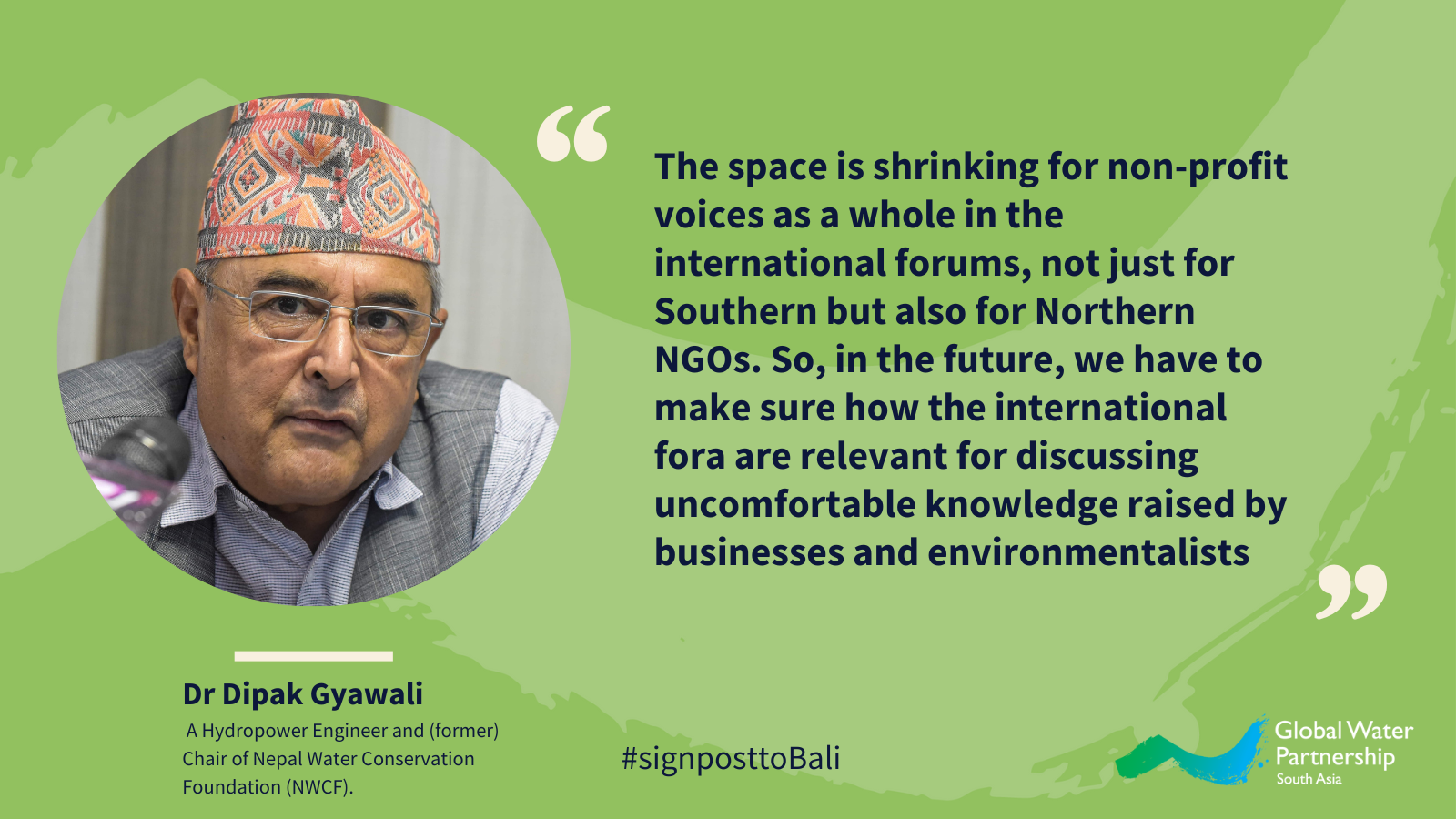The event was organised by Nepal Water Conservation Foundation (NWCF) in collaboration with Women for Water Partnership (WFWP) and GWP South Asia as a part of their monthly information-sharing session “Pani Satsang”. The 80th episode of Pani Satsang was focused on discussing the essence of hydro-diplomacy, as well as key challenges and opportunities that it can offer. More than 50 participants both physically and online attended the webinar.
The Chair, WfWP, Ms Mariet Verhoef-Cohen started the dialogue with introduction to the Signposts to Bali programme; she was followed by Ms Kusum Athukorala, Regional Chair, GWP SAS who emphasised the need to include the “unheard voices, the unseen challenges and unknown solutions” in global events.
The Keynote address was presented on the Cultural Theory of Hydro-diplomacy conducted by Dr Dipak Gyawali. Dr Gyawali, is a hydropower engineer in profession and former Minister of Water, Nepal; he was also the former Chair of NWCF. In setting the scene for the discussion he reiterated that “unfortunately the space is shrinking for non-profit voices as a whole in the international forums, not just for Southern but also for Northern NGOs. So, in the future, we have to make sure how the international fora are relevant for discussing uncomfortable knowledge raised by businesses and environmentalists”.
He was followed by the panellists discussing the “boiling” local, national or international water and climate-related conflicts they have experienced. Then the relevance of hydro diplomacy as they see should be practiced strengthening collaboration between nations. The panellists finally expressed their special messages to take to the 10th World Water Forum in Bali in May 2024.
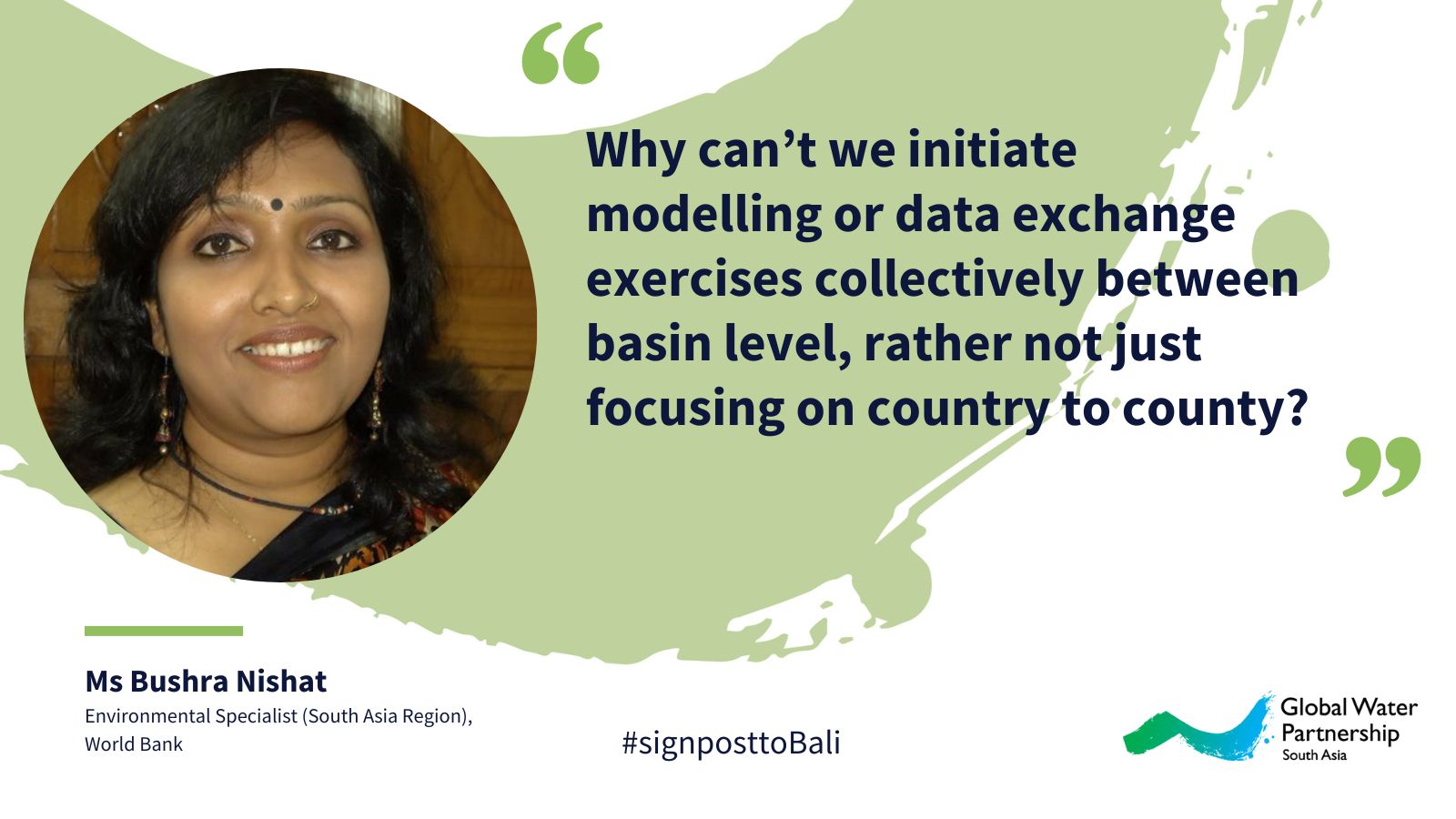 Ms Bushra Nishat from Bangladesh discussed the impact of successful basin-level forums. She proposed “Why can’t we initiate modelling or data exchange exercises collectively between basin level, rather not just focusing on country to county? Why don’t we have a joint basin model which could be the beginning of this discussion but not the end of it”. Ms Nishat currently works at the World Bank as an Environmental Specialist for the South Asia Region. She is an environmental Scientist with extensive experience in numerical modelling coupled with involvement in policy analysis and socio-political dialogues.
Ms Bushra Nishat from Bangladesh discussed the impact of successful basin-level forums. She proposed “Why can’t we initiate modelling or data exchange exercises collectively between basin level, rather not just focusing on country to county? Why don’t we have a joint basin model which could be the beginning of this discussion but not the end of it”. Ms Nishat currently works at the World Bank as an Environmental Specialist for the South Asia Region. She is an environmental Scientist with extensive experience in numerical modelling coupled with involvement in policy analysis and socio-political dialogues.
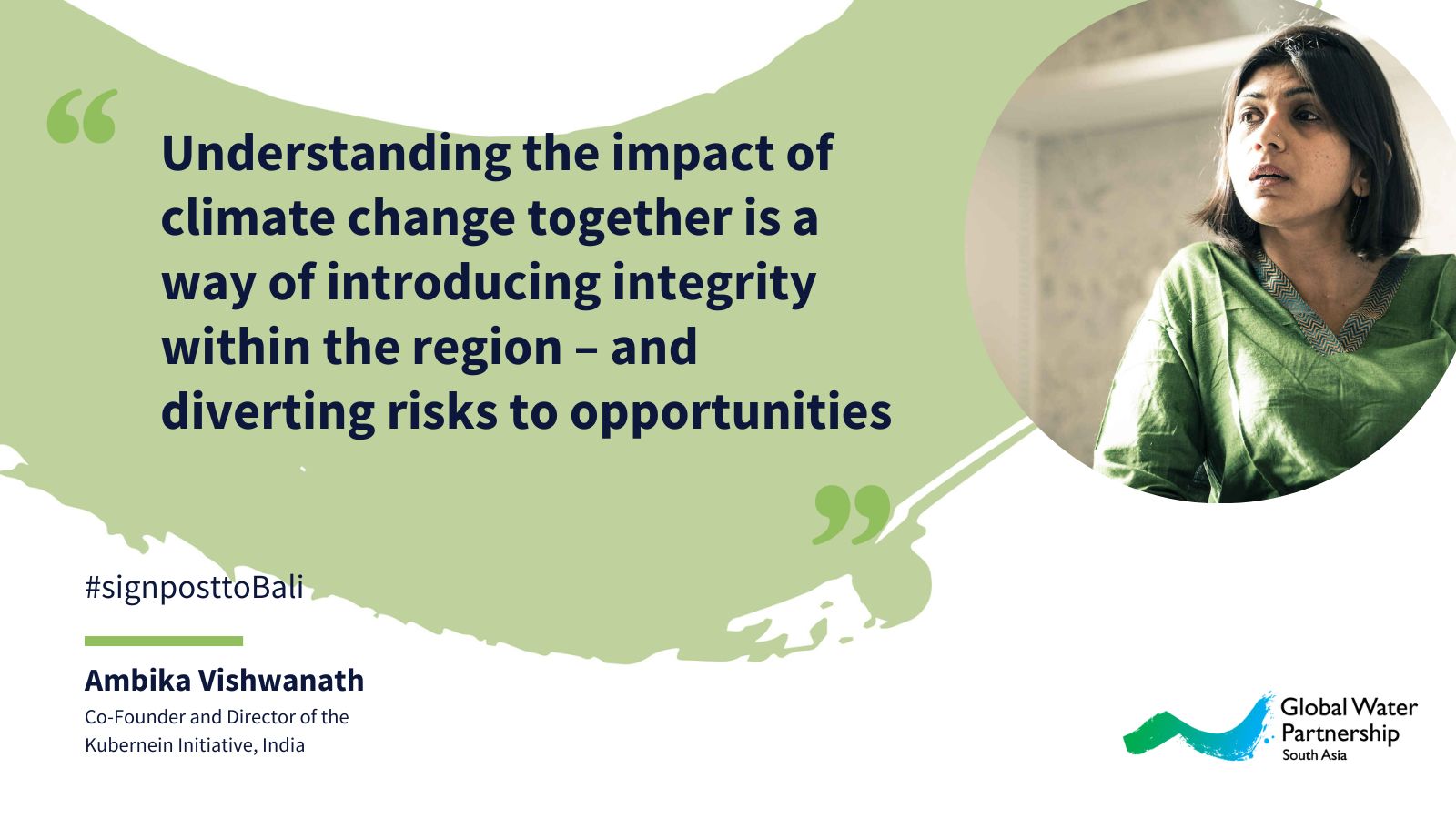 What can we do to bring the whole of South Asia together? Answering that question Ms Ambika Vishwanath, Director, Kubernein Initiative from India mentioned navigation is one of the best remedies. “We have very little knowledge about climate change and its impacts – its impact on water, heat, agriculture, food security and energy that again may impact on water. Therefore, understanding the impact of climate change together is a way of introducing integrity within the region – and diverting risks to opportunities”. Ambika Vishwanath is the Co-Founder and Director of the Kubernein Initiative, an India-based female-founded geopolitical advisory.
What can we do to bring the whole of South Asia together? Answering that question Ms Ambika Vishwanath, Director, Kubernein Initiative from India mentioned navigation is one of the best remedies. “We have very little knowledge about climate change and its impacts – its impact on water, heat, agriculture, food security and energy that again may impact on water. Therefore, understanding the impact of climate change together is a way of introducing integrity within the region – and diverting risks to opportunities”. Ambika Vishwanath is the Co-Founder and Director of the Kubernein Initiative, an India-based female-founded geopolitical advisory.
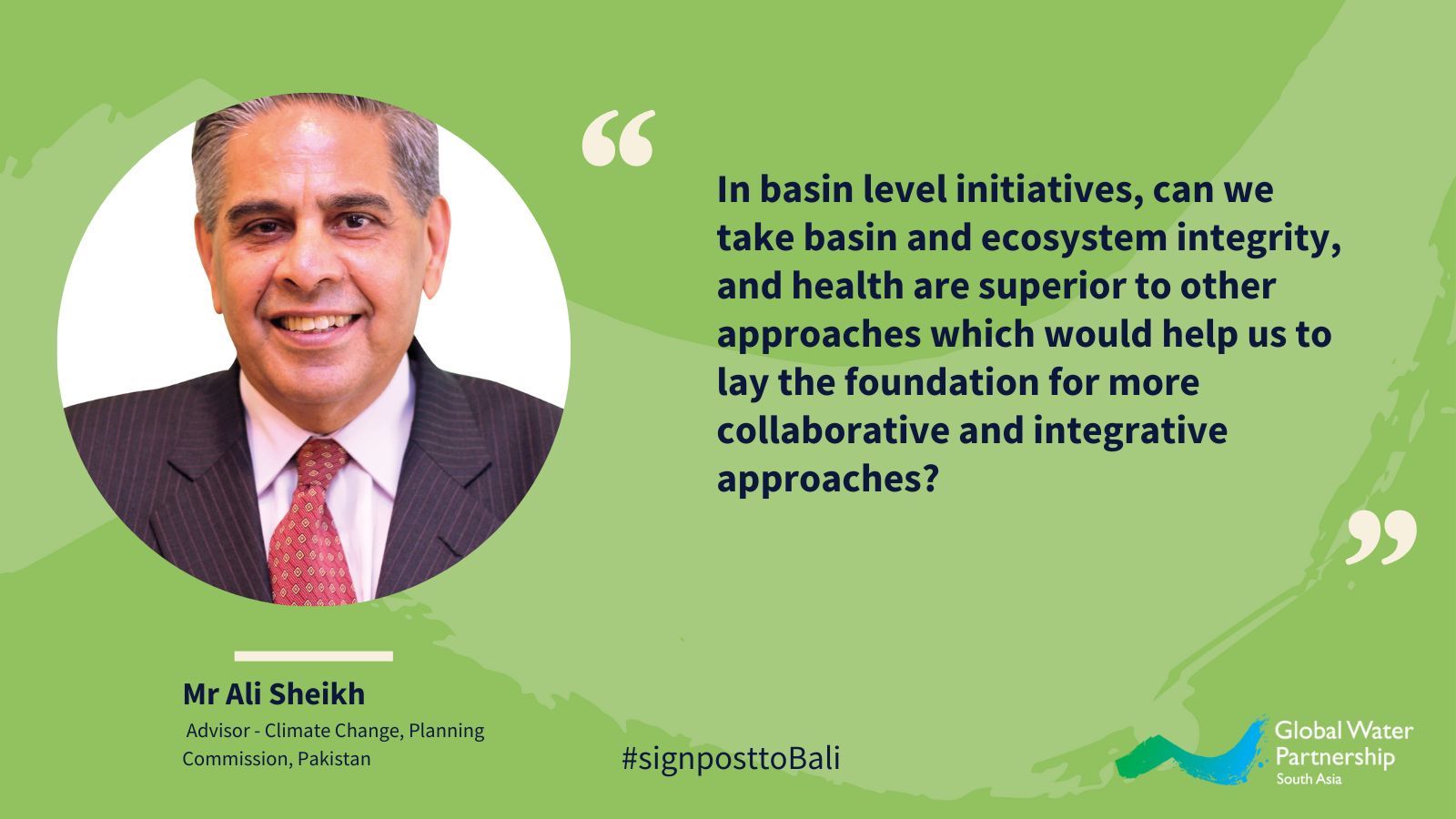 The next panellist was Mr Ali Sheikh, a climate and water expert who is presently working as an Advisor Climate Change to the Planning Commission of Pakistan. He questioned, “In basin level initiatives, can we take basin and ecosystem integrity, and health are superior to other approaches which would help us to lay the foundation for more collaborative and integrative approaches?”
The next panellist was Mr Ali Sheikh, a climate and water expert who is presently working as an Advisor Climate Change to the Planning Commission of Pakistan. He questioned, “In basin level initiatives, can we take basin and ecosystem integrity, and health are superior to other approaches which would help us to lay the foundation for more collaborative and integrative approaches?”
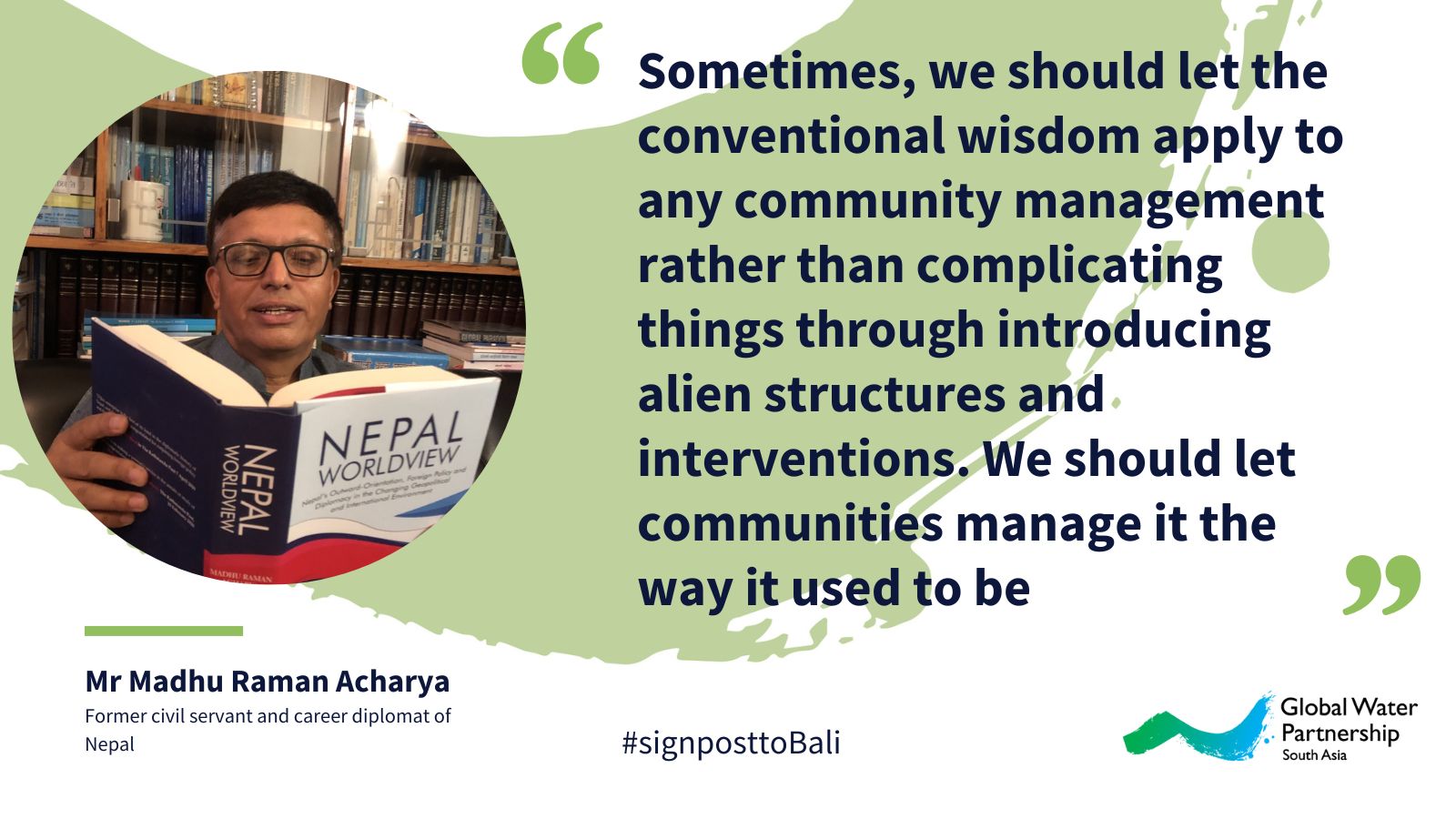 Mr Madhu Raman Acharya the final panellist, is a former civil servant and career diplomat of Nepal. In supporting others' comments said “Sometimes we should let the conventional wisdom apply to any community management rather than complicating things through introducing alien structures and interventions. We should let communities manage it the way it used to be”.
Mr Madhu Raman Acharya the final panellist, is a former civil servant and career diplomat of Nepal. In supporting others' comments said “Sometimes we should let the conventional wisdom apply to any community management rather than complicating things through introducing alien structures and interventions. We should let communities manage it the way it used to be”.
Dr John Dore, Lead Specialist – Climate Resilience and Water Security, for Australia’s Department of Foreign Affairs and Trade (DFAT) moderated the session and Dr Ngamindra Dahal, Chair, NWCF conducted the webinar with a vote of thanks.
The “Signpost to Bali” webinar series was initiated by the Women for Water Partnership (WfWP) and supported by GWP SAS for gathering the voices of the unheard, especially women and youth for the World Water Forum 2024 in Bali. The next webinar is planned for 23 January 2024 on Youth for Water-Accelerating Water Advocacy.
